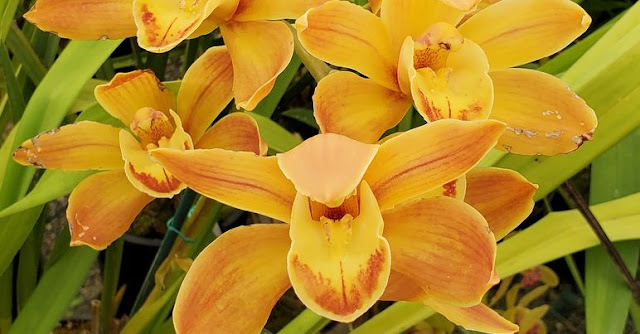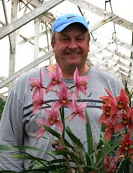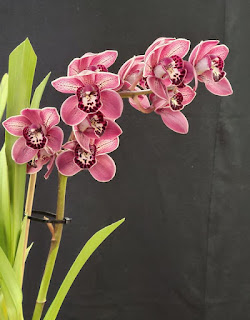
Sacramento society hosts evening with George Hatfield

|
| Cymbidiums need adequate light and water, says expert hybridizer George Hatfield. He will speak Friday evening in Sacramento. (Photos courtesy George Hatfield) |
Orchid royalty is coming to Sacramento!
On Friday evening, Dec. 3, Sacramento Valley Cymbidium Society presents an evening with Mr. Cymbidium, George Hatfield.
To be held at Shepard Garden and Arts Center, this free presentation will be held in person as well as offered via Zoom. Doors open at 6:30 p.m.; program starts at 7 p.m. The public is welcome.

|
|
George Hatfield
|
Based in Oxnard, Hatfield is past president of both the American Orchid Society and the Cymbidium Society of America. In an interview with Orchid Digest, Hatfield shared some of his insights including what he looks for in a plant as a hybridizer.
“Fundamentally, you need to have plants that grow well,” Hatfield told Orchid Digest. “It’s pretty meaningless to produce plants that can’t be grown by all levels of growers. No matter what type of plant you hybridize, it needs to be a good grower. I’ve been aggressively selecting for strong growers for years, and the result is that pretty much everything I produce can be grown by anyone.”
The most common mistake for cymbidium growers? Water, Hatfield said.

|
|
Cymbidiums produce loads of flowers
with the right care.
|
“Cymbidiums need light,” he added. “Most people don’t grow their plants in enough light. The three biggest elements of good culture are light, water, and nutrients. Pay attention to those, and a good cymbidium will reward you with lots of flowers.”
Learn more Friday night at his special presentation. Shepard Center is located at 3330 McKinley Blvd., Sacramento, in McKinley Park.
For more details or Zoom link, email SacCymSoc@yahoo.com or call Ann Carberry at 916-502-3258.
Comments
0 comments have been posted.Sacramento Digs Gardening to your inbox.
Sites We Like
Garden Checklist for week of April 14
It's still not warm enough to transplant tomatoes directly in the ground, but we’re getting there.
* April is the last chance to plant citrus trees such as dwarf orange, lemon and kumquat. These trees also look good in landscaping and provide fresh fruit in winter.
* Smell orange blossoms? Feed citrus trees with a low dose of balanced fertilizer (such as 10-10-10) during bloom to help set fruit. Keep an eye out for ants.
* Apply slow-release fertilizer to the lawn.
* Thoroughly clean debris from the bottom of outdoor ponds or fountains.
* Spring brings a flush of rapid growth, and that means your garden needs nutrients. Fertilize shrubs and trees with a slow-release fertilizer. Or mulch with a 1-inch layer of compost.
* Azaleas and camellias looking a little yellow? If leaves are turning yellow between the veins, give them a boost with chelated iron.
* Trim dead flowers but not leaves from spring-flowering bulbs such as daffodils and tulips. Those leaves gather energy to create next year's flowers. Also, give the bulbs a fertilizer boost after bloom.
* Pinch chrysanthemums back to 12 inches for fall flowers. Cut old stems to the ground.
* Mulch around plants to conserve moisture and control weeds.
* From seed, plant beans, beets, cantaloupes, carrots, corn, cucumbers, melons, radishes and squash.
* Plant onion sets.
* In the flower garden, plant seeds for asters, cosmos, celosia, marigolds, salvia, sunflowers and zinnias.
* Transplant petunias, zinnias, geraniums and other summer bloomers.
* Plant perennials and dahlia tubers for summer bloom.
* Mid to late April is about the last chance to plant summer bulbs, such as gladiolus and tuberous begonias.
* Transplant lettuce seedlings. Choose varieties that mature quickly such as loose leaf.